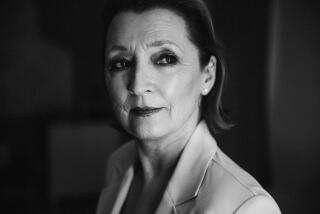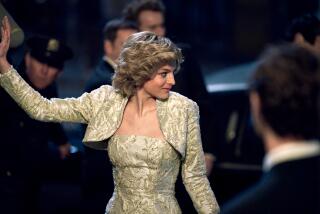Prince’s Marital Woes Become Britain’s Problem : Royalty: The potential divorce of Charles and Diana may be personal, but it touches on issues of religion and public policy.
- Share via
LONDON — His mother is angry. His wife suns herself in silence on a Caribbean beach. His mistress’ friends leak backstairs gossip to tabloid newspapers.
One day he may be king, but as a new year dawns, 47-year-old Charles of England is the prince of wails.
Charles versus Diana. The sad story of a fairy tale that crashed and burned is well-known. What will make 1996 different is that pregnant questions demand answers, and resolution is at hand.
There are issues and quandaries enough to satisfy soap opera fans and constitutional experts alike. Will Princess Diana agree to a divorce? And then what would she do, future queen no more?
Would a divorced Prince Charles remarry as king? What would his mistress do if he didn’t? In the country’s most famous threesome, Camilla Parker-Bowles is, after all, the only one who has not yet blurted out bedroom secrets to television interviewers.
Juicy stuff, but there are national issues at stake as well: British monarchs head not only the state but also the official state religion, the Church of England. Individually and collectively, the royals are expected to be models for a civil, honorable, moral society.
Domestic discord is one thing: Forty-two of every 100 marriages in Britain end in divorce. But marital feuding has gone too far when it discredits the monarchy as an institution.
*
In 1984, when Charles and Diana had their second son, 77% of respondents told pollsters that Britain would be worse off without a monarchy. Then came an increasingly acrimonious marriage, leading to an official separation in 1992.
By 1994, when Charles confessed adultery in a televised interview, polls showed that only half as many Britons were as supportive of the monarchy as they were a decade before.
And in an interview last month, Diana emphasized her unhappiness with the royal family and acknowledged an affair with a cavalry officer. He had already spilled the beans in an intimate book.
Damage to the monarchy led Queen Elizabeth II, the stiff-lipped personification of all that is royal and proper, to order Charles and Diana to divorce.
Charles agreed immediately. Diana has not replied. Since the queen’s demand last week, there has been a nearly constant firing of royal household artillery--in many different directions.
First, those ubiquitous “friends of Charles” told reporters that, once divorced, the prince would not remarry. That was intended to mollify civic, political and theological conservatives such as the association of 1,000 Anglican priests who lamented that the monarchy had fallen prey to a “modern divorce cult.”
Divorce would not disqualify Charles from becoming either king or “defender of the faith” as head of the church. Remarriage is problematic but possible; it requires the assent of both the prime minister and the archbishop of Canterbury, the nation’s senior church leader.
King Edward VIII abdicated in 1936 when he failed to gain permission to marry Wallis Simpson, a twice-divorced American. The current archbishop, George Carey, is more understanding of domestic discord: Two of his four children are divorced.
Charles’ assertion that he would not remarry was overtaken almost immediately by a clarification from unnamed Buckingham Palace sources. While the prince has no current intention of remarrying, they murmured, that does not necessarily mean a lifelong commitment to remaining single.
*
As for the Christmas holidays, Charles passed them with his parents, the queen and Prince Philip, along with his siblings and his two princely sons at the royal country estate at Sandringham.
Diana was conspicuously absent. She had signaled her independence from the royal family in the televised interview, in which she said she would “not go quietly.” If divorced, Diana would never be queen but could look forward to eventually seeing her eldest son, now a 13-year-old schoolboy, crowned King William.
For now, Diana says she would like to be a roving ambassador for Britain. No one seems sure what that means, beyond that it would cost a lot of money and keep her in the public eye.
Diana spent Christmas alone, watching television and eating cold chicken, her friends said. At one point, photographers trailed Diana to what was described as a social visit to the therapist who had helped her through a siege of the eating disorder bulimia early in her marriage.
Then, still with no response to the queen about the divorce order, Diana jumped on a plane to Antigua with a female friend. There, to hear British newspapers tell the story, practically the entire armed forces are mobilized to guarantee her privacy at an expensive seaside villa.
In gray, subfreezing London, meanwhile, Parker-Bowles, 48, the newly divorced wife of an army general and a friend of Charles’ since 1972, has been hermetic. But . . .
“Friends of Camilla say she is tired of conducting their relationship in secret. She is not prepared to be his mistress forever,” the Express tabloid trumpeted this week. “She wants a clear commitment to marriage with some role in a consort capacity and a royal title. After all that has happened, particularly when he admitted their affair on television without her consent, her life has become intolerable,” the newspaper said, quoting unnamed “senior government officials” as well as the usual “friends.”
Now the reports are being denied as “fanciful nonsense” by more unnamed “friends” who talked to a second newspaper, while a third says Prime Minister John Major has warned Charles that the British people would not accept Parker-Bowles as his consort.
Remarriage is a longer-term issue, and while British analysts say that Charles and Diana will certainly divorce in 1996, royalists among them wince at fresh damage that is done with every new headline.
More to Read
Sign up for Essential California
The most important California stories and recommendations in your inbox every morning.
You may occasionally receive promotional content from the Los Angeles Times.













